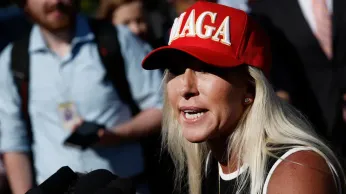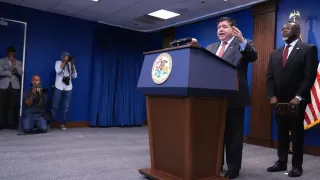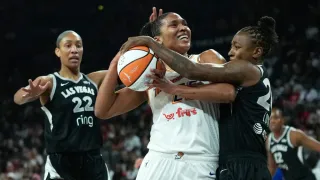
6 hours ago
Marjorie Taylor Greene Calls for Netflix Boycott Over Trans Representation in Kids’ Content
READ TIME: 3 MIN.
U.S. Representative Marjorie Taylor Greene (R-Ga.) became the latest prominent conservative to publicly announce a boycott of Netflix this week, citing concern over the streaming platform’s inclusion of transgender characters and themes in children’s programming. Greene’s statement, posted on X (formerly Twitter), comes in response to a viral social media clip from an older Netflix show that features a transgender child character, igniting debate over the role of LGBTQ+ representation on mainstream streaming services .
The controversy was sparked when the conservative account Libs of TikTok posted a short scene from the Netflix animated series “Strawberry Shortcake and the Beast of Berry Bog,” in which a male character dresses in traditionally feminine clothing to express himself . The post accused Netflix of “targeting children with transgender ideology,” and quickly gained traction among conservative influencers, including billionaire Elon Musk, who echoed calls for parents to “Cancel Netflix for the health of your kids” .
Additional scrutiny focused on other Netflix kids’ shows, such as “Dead End: Paranormal Park,” which features a transgender protagonist, and “The Baby-Sitters Club,” which includes a storyline about a child being misgendered by hospital staff .
Representative Greene’s statement read: “Absolutely disgusting!! Netflix is pushing woke Democrat gender ideology and ‘non-binary’ propaganda onto kids. My Protect Children’s Innocence Act makes it a felony to mutilate children’s bodies under the guise of so-called ‘gender-affirming care.’ No child should ever be a victim to this abuse!” .
Her remarks align with a growing legislative effort among some Republican lawmakers to restrict or criminalize gender-affirming health care for transgender minors and to limit the depiction of LGBTQ+ topics in schools and children’s media . These legislative efforts have been widely criticized by LGBTQ+ advocacy groups, who argue that such measures perpetuate stigma and endanger the well-being of transgender youth.
Netflix has not issued an official statement in response to the latest backlash, and all episodes of the cited shows remain available on the platform’s Kids interface . The company’s Vice President of Inclusion Strategy, Wade Davis, has previously been outspoken in support of transgender inclusion and has argued for the importance of authentic representation in media . Davis, who joined Netflix in 2023 and is a former NFL player and LGBTQ+ educator, has said in the past that “identifying within the trans spectrum challenges the heteronormative binary & anytime you challenge the standards of a nation—you are in danger (hence the rage, hatred and violence trans folks experience)” .
LGBTQ+ advocates highlight that positive representation of transgender and non-binary people in media can foster understanding, reduce stigma, and provide vital affirmation to young viewers who may be questioning their own gender identity. Research from organizations such as GLAAD and the Human Rights Campaign consistently finds that LGBTQ+ representation in media is associated with improved mental health outcomes for LGBTQ+ youth .
The controversy has led to a visible social media campaign, with numerous users posting screenshots of their canceled Netflix subscriptions under hashtags like #CancelNetflix. Some conservative commentators and politicians have described the inclusion of transgender characters as “demonic” or “propaganda,” while investigative journalist James Esses wrote, “Transgender propaganda isn’t just quietly lurking in the background on Netflix. They are actively pushing it on users” .
The financial impact on Netflix has been immediate, with the company’s stock reportedly dipping for several days following the renewed boycott campaign . However, Netflix has weathered similar controversies in the past, most notably surrounding LGBTQ+ content and inclusive programming. The company has historically defended its decision to feature diverse stories and characters, emphasizing the importance of storytelling that reflects a wide range of human experiences .
Debate remains intense over the role of media in shaping perceptions of gender and sexuality. Supporters of inclusive content argue that it reflects the reality of families and individuals across the United States and the world. Critics, such as Greene and her allies, believe that parents should have more control over the messages children receive from media.
LGBTQ+ organizations continue to advocate for greater visibility, noting that attempts to suppress or erase transgender stories are part of a broader backlash against LGBTQ+ rights. “Representation matters because it saves lives,” said a spokesperson for the Human Rights Campaign. “Transgender youth deserve to see themselves reflected positively in the culture, not as objects of controversy or derision” .
The episode underscores the ongoing polarization surrounding LGBTQ+ issues in American society. While Greene’s boycott has energized a segment of the conservative base, it has also reignited calls for solidarity and support for transgender youth from LGBTQ+ advocacy groups and allies. As streaming platforms continue to navigate these cultural divides, the question of who gets to see themselves—and their stories—on screen remains both a personal and political battleground.






